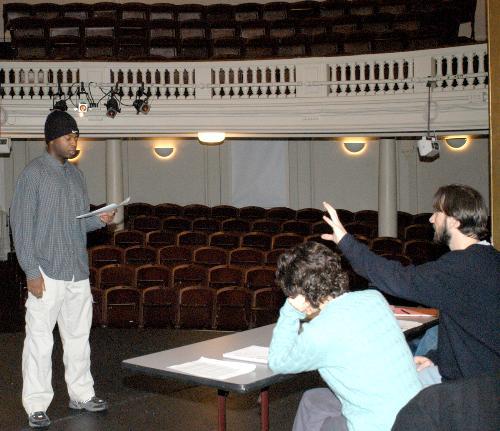
News
Summers Will Not Finish Semester of Teaching as Harvard Investigates Epstein Ties

News
Harvard College Students Report Favoring Divestment from Israel in HUA Survey

News
‘He Should Resign’: Harvard Undergrads Take Hard Line Against Summers Over Epstein Scandal

News
Harvard To Launch New Investigation Into Epstein’s Ties to Summers, Other University Affiliates

News
Harvard Students To Vote on Divestment From Israel in Inaugural HUA Election Survey
Common Casting is Recast
More shows, female roles offered as season begins

From one room comes a female voice, loud and anguished, close to tears. Next door, a deep bass voice sings scales to the plinking of a piano. And from the opposite end of the hallway, a couple is immersed in an argument, the girl indignant and the guy glibly trying to calm her.
Emotions and excitement were running high, as this semester’s Common Casting, sponsored by the Harvard-Radcliffe Dramatic Club (HRDC), entered its third night. Representatives from this season’s shows burst into the Loeb Drama Center and the Agassiz Theater to call groups of nervous auditioners—first-years, seniors, Harvard students and Cambridge residents—for their moment in the spotlight.
But while Common Casting has existed for years, this one is different.
There are more female directors and more women’s parts. There are more shows, higher quotas for Harvard students and fewer overall auditioners, say production teams. There’s a increased emphasis on both student-written and space-specific work. And through extensive publicity, the HRDC board hopes to attract a more diverse group of auditioners to tryouts.
These changes come in the wake of complaints last season by Harvard students who feel they were shut out of roles because of the large numbers of non-Harvard actors who auditioned and were cast.
Finding a Role
While limited numbers of female roles have caused tension in past seasons, this round of Common Casting promises more places for women both on and off the stage.
The number of leading female parts has risen. Emily J. Carmichael ’04, who is directing a play she wrote called Stopover, will cast four main roles, all women. Both shows on the Mainstage—the largest and most challenging space on campus—are looking for 12 men and 8 women.
In addition, of the 25 spring shows participating in Common Casting, 10 will be directed or co-directed by women. Four of the seven regular-season Experimental Theater shows—up from two last fall—and one of the two Mainstage shows will have female directors as well.
“There are a lot of really strong women’s roles this time,” says the HRDC’s publicity coordinator Michael M. Donahue ’05.
Donahue pointed to the increase as one of the reasons that the process has progressed much more smoothly this week.
Actors will also find new opportunities this season at the American Repertory Theater (ART), which is auditioning undergraduates for roles in its production of Ulysses.
“It’s not the habit of the ART to invite undergraduates to audition for its plays,” says HRDC President Ben D. Margo ’03-’04, who is also a Crimson editor. “It’s a nice opportunity to have the new director of the ART bringing in students for that.”
Pushing New Horizons
This season will also afford increased opportunities for student writers. Along with Carmichael, Shelby J. Braxton-Brooks ’03, Ellenor J. Honig ’04 and Dan J. Poston ’04 will direct their own plays and Joy B. Fairfield ’03 will direct HouseBreakHeart, a play she adapted from George Bernard Shaw’s Heartbreak House.
And directors are finding new and strange locations in which to stage their shows. The Tempest will be performed in the Winthrop House Courtyard. Jeremy R. Funke ’04 will direct Hamlet at the First Church in Cambridge, Congregational.
“We’re seeing some nice work in new settings,” says HRDC Campus Liaison Johanna S. Karlin ’05.
Donahue says that the HRDC has gone to great lengths to make sure the campus and city know about Common Casting.
“We’re trying to promote Common Casting outside the usual, established ‘theater community,’” says Donahue. “We’ve been tabling in Annenberg and sending e-mails to large student groups. We basically looked through the entire Harvard website.”
He added that there has been an extra push to try to recruit Latino students, in part because the Mainstage production of Richard III will be set at the time of the fall of the Aztec Empire, with Richard mirroring Moctezuma.
Margo said that the HRDC is reaching out to all ethnic groups on campus.
“The more diverse groups like that we can get into Common Casting, the more we can get those demographics on stage,” Margo says.
Another new aspect of Common Casting this season—which has caused problems for at least one show—is an amendment to the HRDC Constitution passed in December. 60 percent of roles in HRDC-sponsored shows must now be filled by Harvard associates.
Kathy M. Bencowitz ’03, who is directing the Mainstage production of Chess, says that she simply has not seen enough Harvard students to fill the spots in her show.
“Part of what we talked about a lot when we were changing the rule was that it was going to hurt large shows,” said Bencowitz. “This is a large musical. The parts are there, I’d love to give them to Harvard people. I can’t cast people who don’t audition.”
She says that Cabaret saw 200 people during that season’s Common Casting. As of last night, she had auditioned about 60, less than half of whom have been from Harvard.
—Staff writer Laura L. Krug can be reached at krug@fas.harvard.edu.
Want to keep up with breaking news? Subscribe to our email newsletter.
